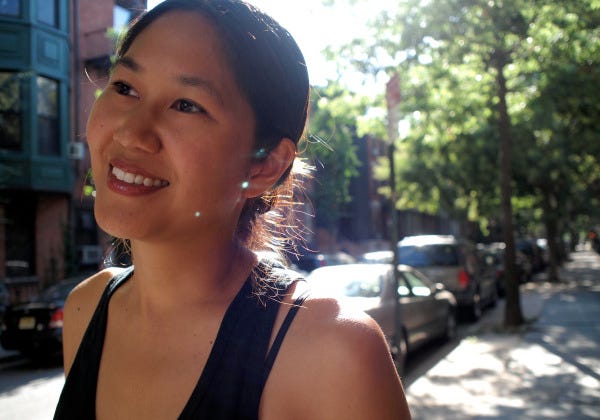Stephanie Wang-Breal, "Wo Ai Ni Mommy"

Over the last 18 years, tens of thousands of Chinese orphans have found homes in the United States. "Wo Ai Ni Mommy" (I love you Mommy) is the account of one 8-year-old girl as she leaves behind her homeland, her foster family and even her language as she is adopted by a loving but imperfect family from Long Island.
"Wo Ai Ni Mommy" plays at Indy Film Fest on Sunday, July 18 at 8:30 p.m. and Wednesday, July 21 at 6:45 p.m. Buy tickets at the festival's web site.
You can read The Film Yap's review of the film by clicking here.
Director Stephanie Wang-Breal was kind enough to answer a few questions for us about her filmmaking journey:
Where did you get the idea for this documentary? Is there any history of international adoption in your own family?
I've wanted to do this documentary since 1999. I had just graduated from college and moved to NYC, where I started meeting all these beautiful adopted girls, ages 5 and up, learning Mandarin. Upon meeting them, I became fascinated with their stories and lives and immediately wanted to follow them and do a documentary on Chinese adoption.
There is no history of international adoption in my family. I was interested mainly from a cultural/ racial perspective.
How did you find the Sadowskys, and how did you convince them to allow you such intimate access?
I met the Sadowskys through the Families with Children from China (FCC) New York chapter. I had interviewed over 100 adoptive families to learn why people are adopting from China, and from those interviews I realized I wanted to follow a family that was about to adopt an older child, so we could hear the child's perspective on the entire international adoption process.
I met the Sadowsky's numerous times over a five month time span, letting them get to know me as an individual so that they could decide whether or not to trust me to follow and tell their story. this film, though, is a real testament to their strength and courage for allowing their everyday lives to be shown to audiences, who have both never experienced and experienced, what it is like to adopt a child from China.
How did Chinese authorities react to your presence as a filmmaker?
They did not react. Because I was a one person crew, I did the sound, camera myself, so I don't think they took me seriously as a filmmaker. I think they viewed me more as a personal friend who was filming an adoption story.
At what point during your filming process did you feel Sui Yong/Faith was starting to open up to her new family?
Every day Faith showed/told us something new. Every day was a new day for her and her family.
There's a brief discussion in the film about having Chinese speakers around acting as a "crutch" for Faith's language skills. Did you worry much about your role of filmmaker intruding on her integration process?
Since I do end up acting as a translator in the film, I did have some initial concern. But those concerns were quickly brushed away by the fact that I took brushed aside my role as a filmmaker and just did what I felt, at the moment, necessary to help faith feel more comfortable with her jarring new environment/ situation. I knew she was already having difficulty coping with what was transpiring in front of her eyes, so whatever I could do on my end, which was to translate, I was going to do.
What role do you think groups like Families with Children from China? Is there a struggle over how much contact with their native culture and language these Americanized kids should have?
I think they do their best to offer Chinese cultural opportunities to their adopted children. I also think the parents are trying to educate themselves about the potential racial/ cultural bumps that may be in their future as their girls/sons get older and start to ask them bigger questions about their identity. It's a constant struggle trying to figure out how much is enough and how much is not enough.
The Sadowskys come across as loving but imperfect parents. What's your take on their less flattering moments -- such as when Donna refuses to help Faith carry books that she can't on her own, or Jeff talks about his admiration for Chinese culture based on Bruce Lee movies, etc.
I think it was very courageous of Donna and Jeff to let me into their lives and let me follow their experience adopting faith. I captured every day moments, where not everyone comes off as the most flattering. If someone filmed my life on a daily basis, I'm sure words, ideas and actions would show that I would not represent me in my entirety. I think all parents have the best intentions, and in the road of parenting, we are stumbling along trying to make sure we give our children the best opportunities while also maintaining our role as parent
Is there anything you personally took away from the years-long journey to make this documentary?
I learned a lot from making this documentary about adoption, family, parenting, race, etc.
Any update on how Faith is doing now?
Faith is doing great.



